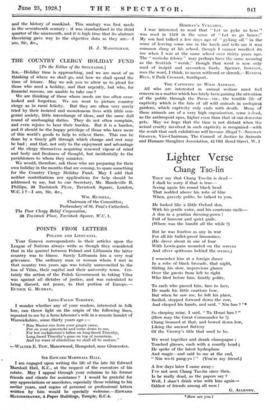POINTS FROM LETTERS
POLAND AND LITHUANIA.
Your Geneva correspondents in their articles upon the League of Nations always write as though they considered
that in the quarrel between Poland and Lithuania the latter country was to blame. Surely Lithuania has a very real grievance. The ordinary man or woman whom I met in that country two years ago was totally unreconciled to the loss of Vilna, their capital and their university town. Cer- tainly the action of the Polish Government in taking Vilna was against all dictates of justice, and was calculated to bring discord, not peace, to that portion of Europe.—
Euxica G. MURRAY.
LONG-FACED TIMOTHY.
I wonder whether any of your readers, interested in folk
lore, can throw light on the origin of the following lines, repeated to me by a farm labourer's wife in a remote hamlet of Warwickshire, some thirty years ago :—
" Rise Master rise from your ginger came,
Put on your gimcracks and come down to me, For hot cockalorum's fallen on long-faced Timothy, Long-faced Timothy's gone on top of mountain, And for want of absolution we shall all be undone."
.—WArrEa E. TEW, Manorwood, Hempsted, near Gloucester. SIR EDWARD MARSHALL HALL.
I am engaged upon writing the life of the late Sir Edward Marshall Hall, K.C., at the request of the executors of his estate. May I appeal through your columns to his former friends and clients for assistance ? I would be grateful for any appreciations or anecdotes, especially those relating to his earlier years, and copies of personal or professional letters written by him would be specially welcome.—EnwAan MAnsoarniatics, 4 Paper Buildings, Temple; E.C.4:
HORMAN'S. VULGARIA.
I was interested to read that " Let us pyke us hens " was used in 1519 in the sense of " Let us go hence." My son had talked a few days ago of " pyking off " in the sense of leaving some one in the lurch and tells me it was common slang at his school, though I cannot recollect its use when I was at the same school over thirty years ago. The " werisshe felowe " may perhaps have the same meaning as the Scottish " wersh," though that word is now only used of insipid and savourless foods. Spenser, however, uses the word, I think, to mean withered or shrunk.—RANDAL BELL, 9 Park Crescent, Southport.
Tim CAPTIVITY OF WILD ANIMALS.
All who are interested in animal welfare must feel concern in a matter which has lately been gaining the attention of the public through the Press—viz., the terrible life of captivity which is the fate of all wild animals in zoological gardens, which captivity only ends with death. Many of these animals are of a very high organization, some indeed, as the anthropoid apes, higher even than that of our domestic pets. May we hope that the time is not distant when the actual cruelty involved in such captivity is recognized—with the result that such exhibitions will become illegal ?—Noannif GRAHAM, Vice-Chairman, The Council of Justice to Animals and Humane Slaughter Association, 42 Old Bond Street, W. 1






























 Previous page
Previous page